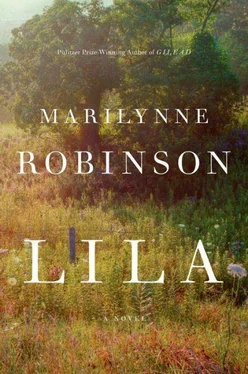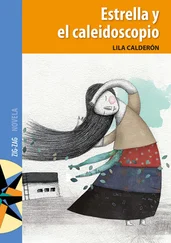Lila liked school. She liked sheets and pillowcases. They had a room of their own, with curtains and a dresser. They ate their supper at a table in the kitchen, where Lila did her lessons while Doll washed the dishes. Doll never did complain, so Lila was surprised when she said they were going to leave, but she didn’t say a word and she didn’t look back, though the house had seemed pretty to her. It was where she had learned to tend roses. But that was their pride, to tolerate whatever they could and not one bit more, to give no sign of wanting or regretting, and for the children to show the grown-ups respect in front of strangers. It was spring, so there would be work, and Doll knew more or less where to look for Doane’s people. They were two days finding them and a week waiting to be asked to eat with them again. Things were always different after their year in Tammany. It was as if they had been disloyal and were never quite forgiven for it. When Lila read a sign to Mellie, GENERAL STORE, Mellie would say, “Well, anybody can see that’s a general store, so what them words going to say? County jail? It don’t look like nothing else but a store, does it?” If Lila read DRY GOODS or NOTIONS AND SUNDRIES, Mellie would say, “Ah, you just making that up. It don’t even mean anything.”
But Lila could read, and Doll was glad of it, no matter what anybody thought. She said it would come in useful. Maybe it would sometime. Mostly Mellie was right — it told her what she’d have known anyway. NO HELP WANTED HERE. It had been good for knowing the names of towns that were too broke and forgotten to need names, which is why you had to read the sign to find it out. Still, when she was getting a can of beans and a spool of twine at the store, she had bought herself a tablet and a pencil. She was just curious to know what she hadn’t forgotten yet. She had turned down the corner of that page, and she copied out those words. And as for thy nativity, in the day thou wast born thy navel was not cut, neither wast thou washed in water to cleanse thee; thou wast not salted at all, nor swaddled at all. No eye pitied thee, to do any of these things unto thee, to have compassion upon thee; but thou wast cast out in the open field, for that thy person was abhorred, in the day that thou wast born. And when I passed by thee, and saw thee weltering in thy blood, I said unto thee, Though thou art in thy blood, live; yea, I said unto thee, Though thou art in thy blood, live. She thought, First time I ever heard of salting a baby. She made the letters slowly and carefully, not so easily even as she had made them as a child, but she told herself she would write a little every day. Practice, the teacher said, when her lessons were so clumsy-looking beside all the others that she was shamed almost to tears. You just need a little more practice.
And she began to look forward to morning. As soon as there was light enough, she sat at the door with the tablet on her knee and wrote. She copied words, because she wasn’t sure how to spell them, and this was a way to learn. Who would ever know if she spelled them wrong? Nobody ever came around. Still it shamed her to think how ignorant it might look to her if she weren’t too ignorant to know any better. So she wrote, In the beginning God created the heavens and the earth. And the earth was waste and void; and darkness was upon the face of the deep. Waste and void. Darkness was upon the face of the deep. She would like to ask him about that. She wrote it all again, ten times.
She enjoyed a morning when the heat was coming on and she was still a little cold from washing in the river. At dawn the chant of the crickets and grasshoppers and the tree toads and cicadas was already slow. It was as if the heat and sunlight were taking more than they were meant to take, more damp, more smell, just because they could. They were so strong, and nothing else was really awake yet. There was a feeling of something like injury about the earth smell and the dew smell, the leaf smell. The tansy didn’t bother her so much anymore. Doane said deer hate tansy, and maybe that was why they hadn’t found the squash growing by the cabin, just a few seeds left lying by the stump other people had used to chop wood and clean fish and gut rabbits. She planted them, and now there were big, tented blooms, yellow as could be, and big vines trailing over the ground. She hoped the old man did not know where she was staying, and she knew he would never come there if he did. But if he ever did come, she hoped it would be in the morning. Those little white moths fluttering over it made that raggedy old meadow seem almost like a garden.
When they were children they used to be glad when they stayed in a workers’ camp, shabby as they all were, little rows of cabins with battered tables and chairs and moldy cots inside, and maybe some dishes and spoons. They were dank and they smelled of mice, and Marcelle made everybody sleep outside except when it rained, but they always had a cabin, and they kept everything they carried in it during the daytime. And Lila and Mellie and the boys, when they weren’t working, played that it was their house or their fort or their cave. They would search it for anything that might have been left there, and if they found half a bootlace or a piece of a broken cup they would make up stories about what it was and why they were lucky to find it. Once, Arthur’s boy Deke found a penny that had been left on a railroad track and squashed flat. He held it up to the door and put a nail through it. Somebody sometime had nailed a horseshoe above the door of a cabin they had for a week, and they felt this must be important. They were wary of the strangers and hostile to their children, except for Mellie, who always wanted to play with the babies and would be just sociable enough to get their mothers or sisters to let her. Mellie playing mumblety-peg and tending a grubby infant between turns, hum-hum-hum, rocking it in her bony arms, playing at mother and child.
They would all be working in the orchards, picking apples or cherries or pears. They would be up in the tops of the trees all day long, and they would never spill a basket or break a branch. It was work children did best. They were given crates of fruit that was too ripe or bruised, and the children ate it till they were sick of it and sick of the souring smell of it and the shiny little black bugs that began to cover it, and then they would start throwing it at each other and get themselves covered with rotten pear and apricot. Flies everywhere. They’d be in trouble for getting their clothes dirtier than they were before. Doane hated those camps. He’d say, “Folks sposed to live like that?” But the children thought they were fine.
She would tell the old man, I didn’t use to mind tansy. I still like an apricot now and then. She pretended he knew some of her thoughts, only some of them, the ones she would like to show him. Mellie with her babies. Doll smiling because she had a bit of sugar candy from the store to slip into Lila’s hand when the others weren’t looking. Any one of them could walk through that field, plucking at the blue stem and the clover, thinking their own thoughts, natural as could be. They had passed through so many other places just like it, a whole world of weedy, sunny, raggedy fields with no names to them. Only that one name, the United States of America. If they could be there the way they were in her mind, before the times got hard, then he could know them. She would want him to know them.
No. Why did she let herself think that way? If he saw this place he would just be embarrassed at how poor she was, how rough she lived. He wouldn’t quite look at her, he’d try not to look at anything else, and he wouldn’t say much at all. She’d be hating him and hoping he knew it. Then when he was gone she would have all that kindness to deal with. And she hadn’t even saved up enough yet for a bus ticket. Maybe that is the one thing she could bring herself to ask them for. A ticket out of town. She’d probably have one in her hand before she finished asking.
Читать дальше












